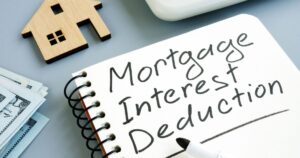A home equity loan (HELOC) or second mortgage (second mortgage) is used to finance the increase in the value of a property’s equity. The term “equity” refers to the surplus worth of a home over the total amount still owed on the mortgage. A second mortgage allows you to borrow against this equity, using your home as collateral.
While a second mortgage can provide you with additional funds to help you pay for home repairs, debt consolidation, or other expenses, it can also significantly impact your finances. Understanding the pros and cons of a second mortgage and its impact on your finances is important before making a decision.
A second mortgage can have both positive and negative impacts on your finances.
Positive Impacts:
- It can provide additional funds for large expenses such as home renovations, debt consolidation, or education costs.
- Interest on a second mortgage may be tax deductible, lowering the cost of borrowing.
Negative Impacts:
- A second mortgage often has a higher interest rate than a primary one, which can increase the overall cost of borrowing.
- Taking out a second mortgage increases your overall debt load, which can increase your debt-to-income ratio and make it harder to qualify for other loans in the future.
- If you default on the second mortgage, the lender can foreclose on your home, putting your primary residence at risk.
Alternatives to a second mortgage, such as personal loans and home equity lines of credit, should be weighed carefully before deciding on the most appropriate action.
Pros of a Second Mortgage
- Access to Additional Funds: A second mortgage provides you with access to additional funds that you can use for various expenses, such as home repairs, debt consolidation, or to pay college tuition.
- Tax Deductible: Interest paid on a second mortgage may be tax deductible, which can help to reduce your overall tax bill.
- Flexible Repayment Options: Second mortgages often offer flexible repayment options, including adjustable interest rates, which can help you better manage your payments.
Cons of a Second Mortgage
- Increased Debt: A second mortgage increases your overall debt, which can negatively impact your credit score and ability to borrow money in the future.
- Higher Interest Rates: Second mortgages often have higher interest rates than primary mortgages, which can increase the overall cost of borrowing.
- Risk of Foreclosure: If you are unable to make your payments, you may risk losing your home to foreclosure as your home’s equity secures a second mortgage.
- Reduced Home Equity: Every time you borrow against your home’s equity, your equity decreases, reducing the value of your home.
- Closing Costs: Like with any loan, a second mortgage comes with closing costs, which can add to the cost of borrowing.
Impact on Your Finances
A second mortgage can significantly impact your finances, both positively and negatively. On the positive side, a second mortgage can provide you with additional funds and the interest paid on the loan may be tax deductible. On the negative side, a second mortgage increases your overall debt, which can negatively impact your credit score and increase the overall cost of borrowing.
Before committing to a second mortgage, you should thoroughly evaluate your current financial condition and needs. Shop around for the best interest rates and conditions if you’re considering getting a second mortgage, and talk to a financial counselor to be sure it’s the best option.
FAQs
What is a second mortgage?
One way to borrow money against the value of your property is via a second mortgage. It is called a “second” mortgage because it is taken out after your primary mortgage, with the primary mortgage having the first claim on the property if you default.
What are the advantages of a second mortgage?
A second mortgage can provide additional funds for large expenses such as home renovations, debt consolidation, or education costs. Interest on a second mortgage may also be tax deductible, lowering the overall cost of borrowing.
What are the risks of a second mortgage?
The primary danger of getting a second mortgage is that it will raise your debt-to-income ratio and make it tougher to get future loans. If you default on the second mortgage, the lender can foreclose on your home, risking your primary residence.
How is the interest rate on a second mortgage determined?
Several factors, including your credit score, the amount of equity in your home, and the current interest rate environment, determine the interest rate on a second mortgage. Second mortgage interest rates are generally higher than primary mortgage rates, as they are considered higher-risk loans.
What are some alternatives to a second mortgage?
Second mortgages aren’t the only option, either. Personal loans, HELOCs, and mortgage refinancing are all viable choices. Each option has pros and cons, so it is important to carefully consider your financial situation and goals before deciding.
Visit our website ExpressMortgageQuotes.com to learn more.




